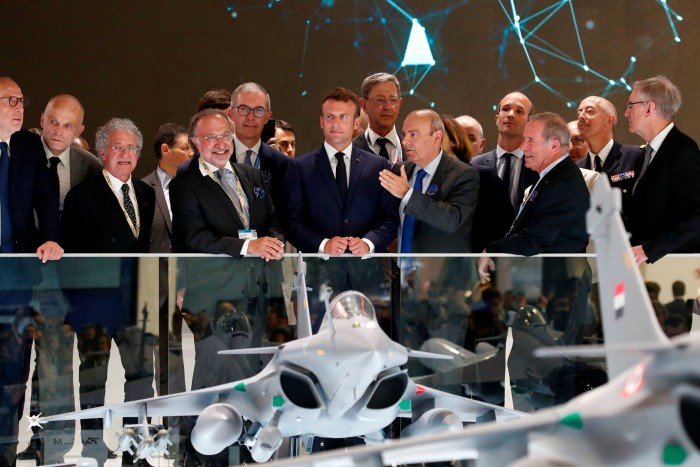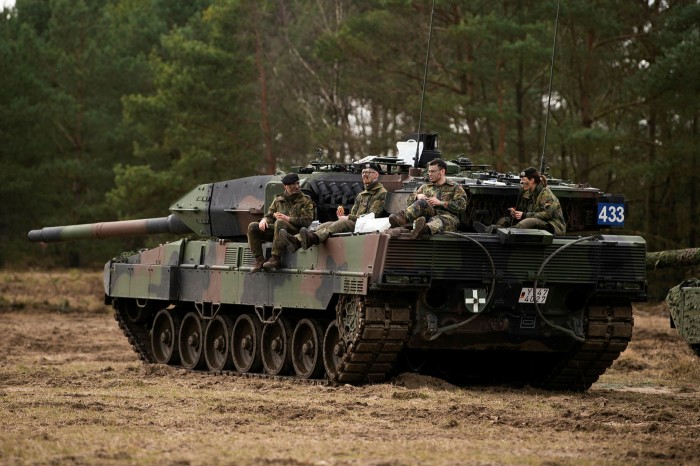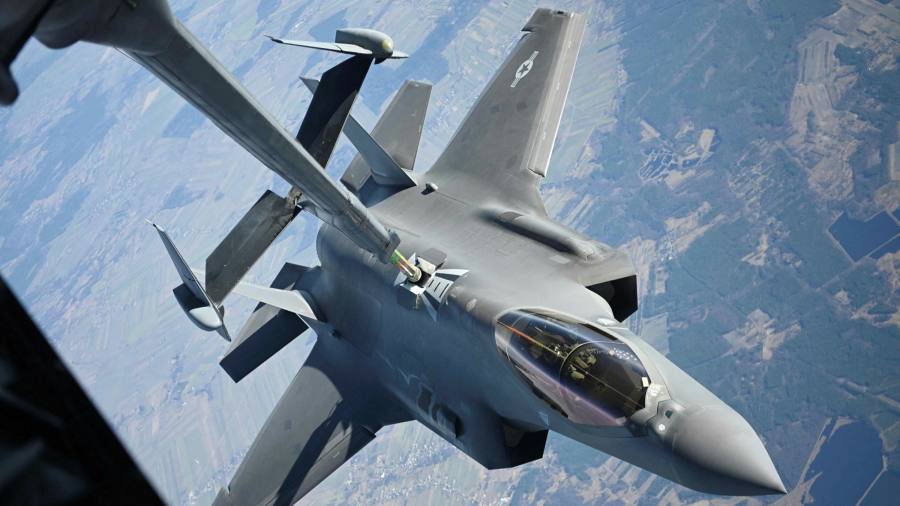Germany’s decision to lift the cap on its military budget offered a beguiling future for Europe’s defence industry as the region’s biggest economy readied itself to write large cheques on everything from jets to tanks.
But less than a month since the invasion of Ukraine prompted Berlin’s historic move to establish a €100bn fund to modernise its armed forces, the initial euphoria risks giving way to the divisions that have long bedevilled European collaboration on defence.
The trigger for the reversal in sentiment was Germany opting earlier this month to replace its ageing Tornado fleet with a batch of F-35 fighter jets made by US defence group Lockheed Martin.
Handing Lockheed the order prompted dismay in France, with the industry angered that the choice of an American weapons system sent the wrong signal when the focus should be squarely on bolstering Europe’s own capabilities.
“The French will not like it at all,” one top European defence executive said of the F-35 order. The invasion of Ukraine had “reinforced the need for a strong defence industry as well as armed forces in Europe”, they added.
The sudden need to overhaul Europe’s decades-old military order has revived tensions over the Future Combat Air System, Europe’s flagship defence project launched by Berlin and Paris to great fanfare in 2017.
Best known for its ambition to build a new European fighter jet, FCAS, which Spain joined in 2019, is seen as a central building block for the region’s defence and procurement policy.
Rather than the myriad of fighter jets flown by European air forces today — spanning the Eurofighter, Germany’s Tornado, France’s Rafale and Sweden’s Gripen — FCAS envisages just one that will be the backbone for every country after 2040.
Amid the alarm in Paris over the Lockheed order, Berlin has insisted it is still committed to the programme, which relies on the continent’s biggest aerospace and defence groups: Airbus, France’s Dassault Aviation and Thales, and Spain’s Indra Sistemas.
However, even before Berlin’s move, concerns that the FCAS project might never take off were deepening because of the wrangling between Airbus, which represents Germany in the project, and rival Dassault.
Battles over technology sharing and who would lead critical parts of the programme have beset FCAS since its launch.
Eric Trappier, chief executive of Dassault, warned before the F-35 deal that such an order would add to French irritation over FCAS and that it would “cool our support”.

Earlier this month, the Dassault boss said that development work on FCAS had in effect ground to a halt, with the company taking its engineers off the programme until it was able to agree a way forward with Airbus.
“In 2022, we’ll have to make a decision. We cannot wait with our pen in our hand over a blank page,” a visibly frustrated Trappier told analysts after the group reported results.
Dassault declined to comment further, pointing to Trappier’s recent remarks. Airbus declined to comment.
One of the reasons the F-35 order risks proving problematic for FCAS is because it potentially sets Germany and France on diverging timelines, according to a former European defence industry executive.
While the German need for a new fighter has been pushed closer to 2050 with the F-35 order, the French have their Rafale only until about 2035. “The timeline and point at which France and Germany’s needs meet has been pushed back,” the executive said.
Indeed, Claudia Major of the German Institute for International and Security Affairs, insisted that if FCAS ultimately failed it would not be because of Berlin’s F-35 order, saying that the two are “totally different things”.
“Since the start [FCAS] has been the example of difficult European industrial co-operation, of mistrust and of everyone trying to defend their own industrial interest,” she said. “You launch a major project that has the ability to change industry strategy and then you don’t invest enough in the political ‘flanking’ to support it.”
It has not been devoid of progress. Last spring Germany, France and Spain agreed to develop a flying demonstration aircraft by 2027. Some industrial accords have also been struck, including on separate pillars of the programme spanning space communication and manned and unmanned aircraft.
Nonetheless, divisions remain on the next-generation fighter itself, including over the all-important flight control system, which Dassault said it needed to develop and manage itself.
Francis Tusa, editor of newsletter Defence Analysis, argued that what helped to shift the balance in the relationship between Airbus and Dassault in recent months were significant export orders for the French company’s Rafale, including from the United Arab Emirates.
“Team France no longer needs Germany in the programme. They have orders coming out of their ears,” he said, adding that he expected further orders for the fighter that could take production through to 2036.
If FCAS flounders, it will not be the first time that France, Germany and Spain have failed to turn ambitions over defence into an industrial reality.

France notably went its own way to develop the Rafale fighter, while Germany is part of the Eurofighter consortium with the UK, Italy and Spain. On battle tanks, Germany has the Leopard while France has the Leclerc.
Other programmes are under way that will test nations’ abilities to work together, including the MGCS tanks project (to replace the Leopard and the Leclerc) and Eurodrone, to develop a series of unmanned drones.
As Russian’s invasion forces European capitals to rethink their defence strategies, industry executives say that effective collaboration requires an acceptance not every country can have it all.
“Not every country can have every capability given the limits of defence budgets in Europe,” said one defence executive. “If you truly want to have a capability . . . then there needs to be some form of collaboration on EU programmes and consolidation.”
Alessandro Profumo, president of Europe’s trade body ASD and chief executive of Italy’s Leonardo, struck a hopeful note. The German move to boost its defence spending, he said, was “incredibly important for the EU” and will be a “catalyst for more European defence co-operation”.
The FCAS can still get back on track, industry experts said. One noted that while Dassault might be able to live without FCAS given its Rafale orders, the French air force would still need a more capable fighter by the 2040s.
“The problem will be, does France want to be left alone? They want to lead but will they lead alone,” said an industry executive. “I think they will compromise to keep a partner”, they added, referring to Germany.
Others highlighted that while Dassault had already flagged it was working on a “plan B” should FCAS unravel, France would lose out on shared research costs and other savings that the project brought.
“It wouldn’t be insurmountable [to lose FCAS] but it would be costly,” said Jean-Louis Thiériot, a member of parliament for France’s conservative Les Républicains party who sits on a defence commission.
Asked shortly before the invasion whether failure to reach an agreement with Dassault was an option, Airbus chief executive Guillaume Faury countered: “Well, that’s not the way we look at it. We think FCAS is front and centre to the strategy of Europe.”


